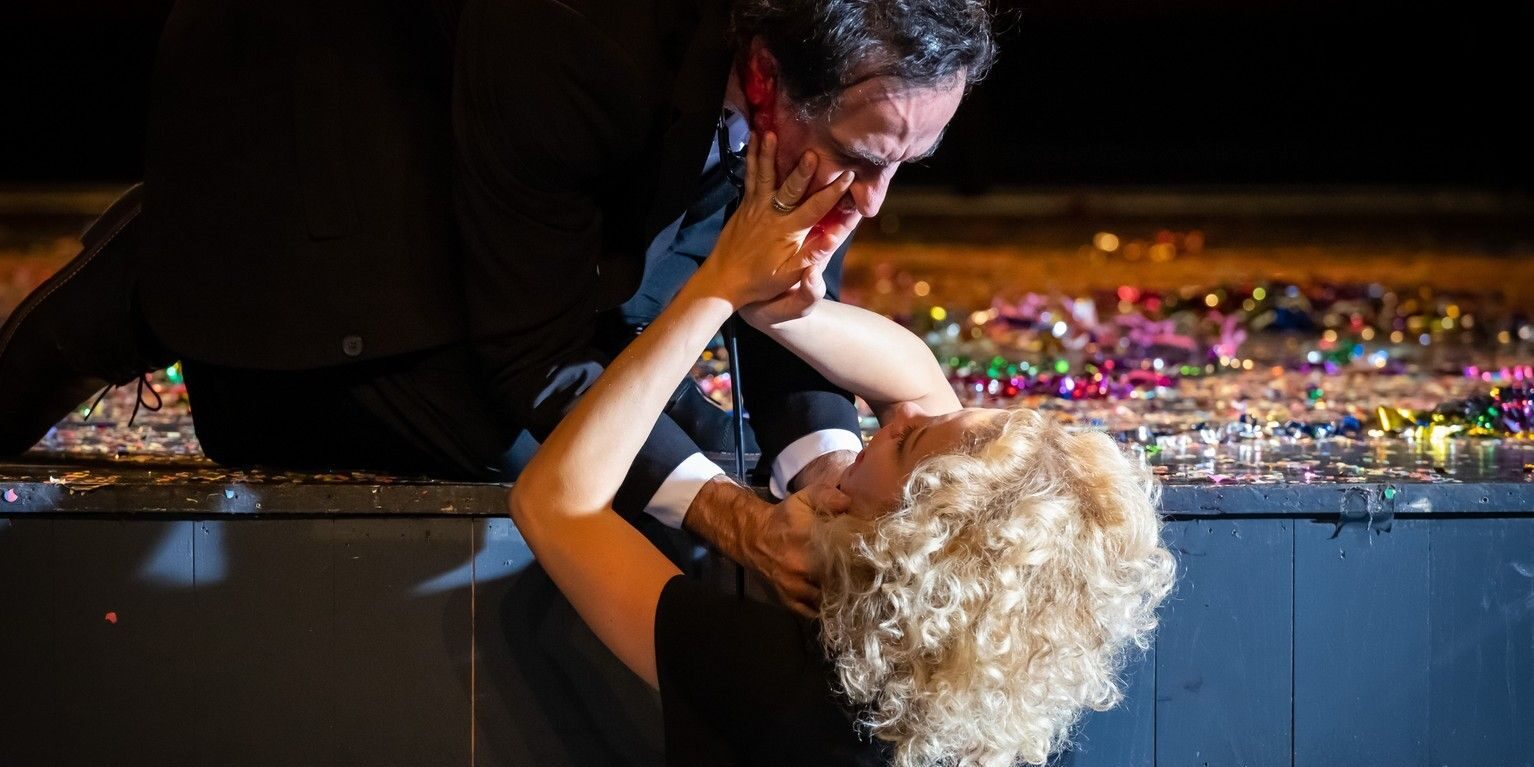National Theatre Sarajevo, premiere 9th December 2022 /Atelje 212, Belgrade, premiere 2th March 2023
Born in 1947, the Italian theatre director Paolo Magelli occupies an important place in the history of Balkan theatre and continues to make his mark as a director in the region.
At thus year’s Yugoslav Theatre Festival, which took place between 1st- 7th November in Užice in Serbia, the programme consisted of seven plays, including two directed by Magelli. One was Chekhov’s Ivanov in a production staged by the National Theatre of Sarajevo production, the other was Florian Zeller’s ubiquitous play The Father, which marked Magelli’s return to Belgrade’s Atelje 212 after 35 years.
Ivanov is a play that can be seen as a turning point between Chekhov’s early and mature periods. The plot follows Nikolai Ivanov as he struggles with various problems in his life, including depression, financial difficulties and an unhappy marriage. In a play deals with boredom, despair, melancholy, aimlessness and moral confusion, Chekhov succeeds in creating complex characters who are confronted with inner conflicts and questions about the meaning of life.
The Seagull, Uncle Vanya, Three Sisters and The Cherry Orchard, which are considered superior to Ivanov, are characterised by suggestiveness, elliptical expressions, subtle symbolism, meaningful pauses and expressive restraint – all of which can only be guessed at in Ivanov. It is a predictable play in which nothing is concealed, in which the characters speak with little restraint about themselves and others. The work is typical Chekhovian in its tone and style and its dark humour and is only partially representative in terms of the subtle characterisation of the characters and the symbolic ramifications.
Nevertheless, as a literary classic, Ivanov represents an explosion of possibilities that a director often attempts to tame and reduce to an original, clear framework. Instead, Magelli’s Ivanov seems to reinforce the indeterminacy of the meaning in Chekhov’s text. As a director, Magelli will throw an unimaginable amount of confetti into the air, completely covering the almost completely empty stage. On the one hand, he uses a modern wardrobe to bring the events into the present. On the other hand, the minimal set design prevents people from understanding when and where the action is taking place. A long bench at the bottom of the stage seems to represent a kind of waiting room, perhaps at a railway station, from where the trains transport the characters through time and space. Overall, the empty space brings the actors and the characterisation of the figures to the fore.
The performance of Aleksandar Seksan, in the role of the title character, draws from the realistic reservoir. Without any well-thought-out linguistic melody, the words just gush out of him, leaving nothing but a completely flat and irritating lament. However, it must be emphasised that such a performance is actually entirely in keeping with the characteristics of Ivanov’s character, as a man who turns away from the world, withdraws into his shell of melancholy and inevitably rots and withers there.
The rest of the ensemble are armed with an arsenal of stylised, expressive acting. With a musical cacophony of loud, inarticulate sounds, the ensemble dances with forced and sharp movements. Each performer individually develops a series of unique gestures, from which Maja Izetbegović stands out by kissing the place where Ivanov treads and expressing her emotions by head-butting the interlocutor’s chest. Such exaggerated acting by the entire ensemble (with the exception of the title character) is typical of comedy theatre, but it is forced to such an extent that it evokes a feeling of discomfort rather than of laughter. Magelli is actually experimenting with the genre because he uses the means of comedy to achieve a dramatic effect. This is very much in keeping with the genre discrepancy that is so often applied to Chekhov’s work: he thought he was writing comedies and people saw them as dramas.
But where does Magelli’s version lead? To what destination do we follow the director?
I followed everything closely, trying to see through the series of strange actions and understand the author’s intention behind them. But as the actors admitted at the festival round table afterwards, these arbitrary acting inventions came to them spontaneously during rehearsals, the actors were guided by their feelings not by the director. Instead of thinking about the riddle of Ivanov and deciphering it, Magelli answers the riddle with more questions. The paradox of this direction is that the performance works very well and it consistently brings Chekhov’s text to life, offering a harmonisation of theatrical arbitrariness that only gives the impression that there is a coherent plan behind everything. All this could be taken as an interesting and charming advantage if the trek through this desert of meaning didn’t take two and a half hours. Whether or not you will be fascinated or disappointed by this Magelli mirage depends on your mood and your willingness to make sense of this hollow structure.

The Father – Atelje 212
The Father, the most popular play by the very popular French writer Florian Zeller, is part of a trilogy that also includes The Son and The Mother. Exploring the mental terrain of a man succumbing to dementia, Zeller builds a labyrinth of the mind from the fragments of a broken consciousness. With in this labyrinth, there are corridors that intersect and intertwine, appear and disappear. Time and space become an elusive and capricious whim of fate, which the protagonist Andrei tries tirelessly and in vain to tame day after day, hour after hour, as his consciousness sails through Lethe, the river of oblivion. The slow current carries him away from his daughter Anna, who only sees his silhouette when he occasionally lands on the islands of lucidity.
The success of Zeller’s play lies in its unique structure. While in classical drama the characters appear before us as they are, in Zeller’s psychological labyrinth we see the faces Andrei encounters as his demented consciousness allows – their appearance depends on his current state of composure. Zeller carries us across the unstable ground of dementia; we enter the territory of fickle obsessions, we wander through the plains of deceptive illusions. This is a world in which nothing is as it seems, and no one can be trusted.
Magelli does not impose authentic and original visions on Zeller’s text, but approaches it by consistently following the circumstances that the play brings to the surface. He stages the alternation of lucid and insane states in gloomy realism with a touch of boulevard comedy. Everything takes place in an almost empty space: a table, chairs and a sofa illustrate the spacious flat, while a large painting of a faceless man by René Margit hangs behind it.
As Andrei, Voja Brajović carries the staging with concise simplicity. Almost effortlessly and unobtrusively, he transforms from an aggressive male boulder into a tearful child miniature, from the heights of self-confidence he gently descends into the confines of confusion, from a whirlwind of joy he meekly calms down into a motionless, distant figure. Among the guests attending Andrej’s game of forgetfulness, Hana Selimović stands out in the role of his daughter, who skilfully meanders through the paths of love and frustration, confusion and exhaustion at the same time.
The sombre tonal minimalism of the compositions, played live by the band KOIKOI, play a decisive role in the fundamentally tragic atmosphere of this performance. The music prevents the comic moments from getting out of hand, but the sounds created by the band also emphasise the moments of mental emptiness that overwhelm the main character and interrupt the continuity of his consciousness.
Working with a skilled acting ensemble, an experienced director like Magelli is able to perfectly capture the poignancy of Andrei’s search for lost time.
For tickets and further information, visit: nps.ba
For tickets and further information, visit: Atelje212.rs
Andrej Čanji is a theatre critic and theatrologist based in Belgrade.








